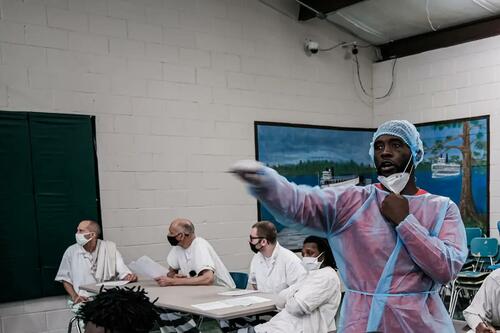If You’re A Criminal, This Is the County To Avoid
Authored by John Haughey via The Epoch Times (emphasis ours),
Across a six-decade career, beginning as a 16-year-old ambulance driver to his ascension as America’s most renowned lawman, Grady Judd has made one thing clear.
He’s that guy, that old-school sheriff whose tough-talking press conferences garner national attention, but he’s also a lifelong student of integrating new-school techniques with emerging technologies, a pioneering innovator in administration, and a conscientious mentor who lives as he leads.
And so, on this April afternoon, Mr. Judd, 70, is looking back on 54 years in public service by doing what he’s always done, looking forward.
He’s prioritizing goals for his sixth term as sheriff of Polk County, a 2,000-square-mile sprawl of Central Florida sawgrass savannah between Orlando and Tampa that’s doubled in population in a decade.
His new term officially begins in January but it actually began the February day he filed to run, instantly clinching his third-straight unopposed re-election.
There’s plenty of time to talk about the past but, right now, he told The Epoch Times, “There’s plenty of work to do over the next four years in keeping crime down.”
Mr. Judd said the 1,800-employee Polk County Sheriff’s Office (PCSO), which includes 1,100 deputies, 1,330 vehicles, and a 2,500-bed jail with a $236 million budget, will be busy doing just that every day, all day, while taking on two initiatives.
He is launching a program to help keep the mentally ill out of jail, a chronic national urgency that defies easy solutions, while training a unit to combat the next great global crime challenge: artificial intelligence (AI).
“Right now, AI is capable of emulating voices. Right? So we’re going to have to protect the community from false AI allegations and keep evil parasites from attacking us from within as well as internationally,” he said, noting it’s the first such unit created by a local law enforcement agency in the United States.
A pressing focus everywhere, he said, is to “reduce the need” for first-responders to be roadside therapists in protecting the mentally ill from themselves and others, and to find alternatives to using jails as primary—and often only—sources of medication for many with mental health issues.
As a newly-minted deputy in 1974, he recalls, those arrested exhibiting mental problems were housed in a regional hospital where inmate patients were treated.
“Fast-forward to today” and his deputies don’t have that option, Mr. Judd said.
“The state and federal government did away with mental hospitals. So where did those mentally ill end up? They ended up in prison, in county jail lockups. They ended up underneath overpasses, sleeping behind buildings, out in the woods.”
Institutional options narrowed as pharmaceutical solutions expanded, he said. Advocates for the mentally ill argued, “They have a constitutional right not to be incarcerated’ and, ‘Oh, we have these new medicines. They just have to take the medicines.’”
Good concept, Mr. Judd said, bad plan.
“Where do we find them to give them their medicines? And, oh, you’re not going to provide medicines? How’re they going to afford it? It’s very expensive” especially for mentally ill people living “out in the woods,” he said.
So he has a plan—and $1 million in seed money from Polk County commissioners to provide court-mandated medications for itinerant offenders.
“We’re in the infant stages of that. We’ve gotten total cooperation from everyone,” Mr. Judd said of a coalescing coalition that includes providers, the courts, state attorney’s office, public defenders, and advocates for the mentally ill. “That’s pretty remarkable that everybody says, ‘Yes, let’s do this.’ It’s a win-win for everyone.”
In an age of polarity, a “win-win for everyone” is a rare air that Grady Judd exudes.
He’s doing what he’s wanted to do since he was 4, what he believes God put him here to do, to protect the place where he was born, raised, and lived his whole life, where he married his high school sweetheart and raised two sons, where he pioneered crime-fighting tactics in a changing world while never wavering from fundamental truths such as right from wrong, good from bad.
In exchange, Polk County got the right sheriff at the right time, a leader to meet the challenges posed by growth as it evolved into an urbanizing I-4 corridor where 100,000 new people have arrived each of the last three years.
And yet, unincorporated Polk County’s 2023 crime rate of 1.06—one per 100 residents—is less than half the state’s rate and lowest since the metric was created in 1971, lower than when it had three times fewer people and 88 percent less than when it had half as many people.
A “win-win” for all—except criminals.
“I’m blessed to live God’s mission for me,” Mr. Judd said. ”All I’ve ever wanted to be was sheriff—the sheriff of Polk County.”
Sheriff-in-Waiting
Raised in a Lakeland subdivision of cinder block homes without air conditioning, Mr. Judd shows office visitors a black-and-white 1954 photo of him sitting on an uncle’s lap. His uncle was White County, Tenn., Sheriff Joe McCoy, but it was Grady Judd wearing the sheriff’s star.
He was the cop when playing ‘cops and robbers’ with childhood friends, grew up watching TV shows such as ‘Dragnet’ and ‘The Andy Griffith Show,’ and was scanning police radio frequencies and mastering codes at 12.
As he told The Epoch Times in November 2023, his father, a Cadillac dealership service-manager, was a church deacon. “I was raised in the church,” he said. “We were sometimes the first to arrive and the last to leave.”
Faith, his “guiding light,” compelled him to be a relentless teenager in informing the sheriffs office he’d be joining them soon and someday be the boss.
As a high school junior in 1970, he was hired as a $1.65-an-hour ambulance attendant in Winter Haven. He helped deliver a baby at 16 and at 17, convinced the notoriously recalcitrant musician George Jones, in a drunken rage, to get into his ambulance, later admitting he had no idea who the world-famous country star was.
After going to high school by day, finishing his ambulance shift at night, Mr. Judd hung out at the sheriff’s office, effectively forcing them to hire him two months after graduation as a dispatcher despite a minimum-age requirement of 21.
He remembers July 21, 1972, a humid, storm-stirred Friday night, his first shift at Bartow’s Hall of Justice, which “housed the entire justice system” and “one teletype computer.”
Richard Nixon was president, Reuben Askew was governor of Florida, gas was 34 cents a gallon, ‘The Godfather’ was a box office hit, Bill Withers’ ‘Lean On Me’ topped the charts.
Two months later, Mr. Judd married his fiancé, Marisa, also 18 and also newly hired at a municipal finance department. They lived on combined salaries of $550 a month. They’ve been together since.
When legislators waived the 21-year-old requirement to be a law enforcement officer. Mr. Judd convinced Sheriff Brannen—the icon of his youth—to send him to the state’s police academy. Just before he turned 20, he was sworn in as the first-ever PCSO deputy under 21.
He hit the road as a 19-year-old deputy in February 1974 in a green-and-white Ford Galaxy and a pistol his father had to buy because state law precluded him from doing so. Nevertheless, as Mr. Judd says, “The rest is history.”
Read more here…
Tyler Durden
Mon, 04/22/2024 – 18:20
via ZeroHedge News https://ift.tt/enB7WGv Tyler Durden


